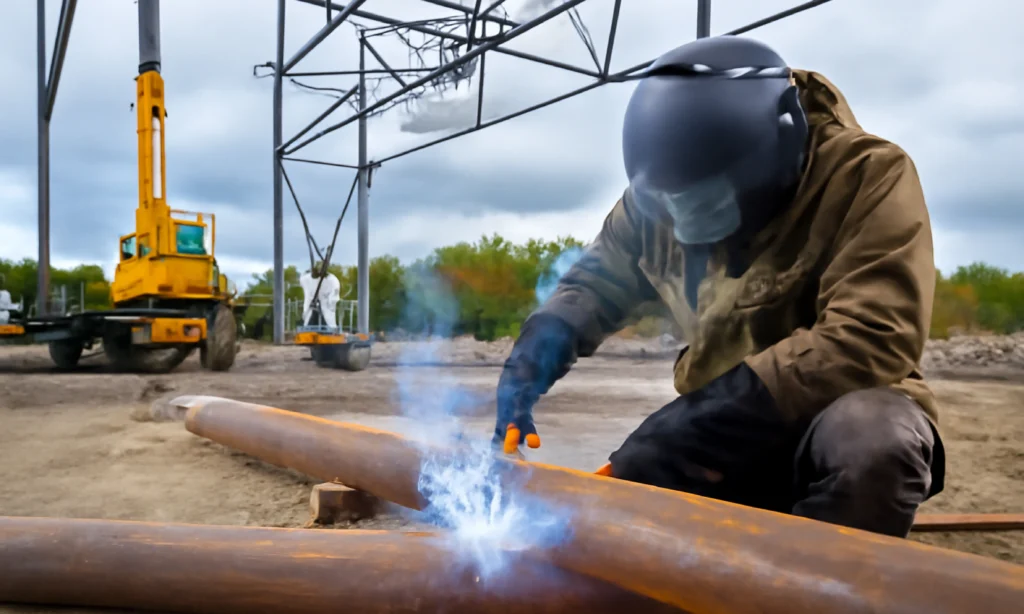The construction boom in Malta has opened up new possibilities like never before to skilled tradespeople and carpentry is at the centre of this boom. The Mediterranean island state provides good salaries, a 12-month working year and a special lifestyle that appeals to craftsmen throughout Europe and other parts of the world.
Are you planning to have Malta as your next career destination? This guide will provide you with everything you need to know about being a carpenter on the island. We will take you through the nitty-gritty of what you will need to know in terms of visa requirements, salary expectations and some of the insights you need to take into consideration in order to make an informed decision.
The Reasons why Malta attracts International Carpenters
The geographical position of Malta, between Europe and Africa, has placed it at the centre of international business and tourism. This economic expansion is directly converted to the demand in construction, which gives constant employment to skilled carpenters.
Construction industry in the island has been increasing by 15 per cent per annum in the last five years due to residential projects, commercial constructions and infrastructure development. In contrast to the seasonal markets, the mild climate in Malta enables the construction work to go on throughout the year, giving steady income opportunities.
There are also EU membership benefits in Malta. EU citizens are allowed to work without a visa and non EU citizens are able to use a range of work permit schemes to attract skilled workers.
Learning about Malta Construction Market
The construction industry in Malta is one of the largest employers that employs about 8,000 individuals and carpentry is among the most demanded specializations. The market is split into a number of major segments:
- Residential Construction: New apartments and other house developments all around the island generate a constant need of interior and exterior carpentry.
- Commercial Projects: Office buildings, retail centers and hospitality centers need fine finish carpentry and custom installations.
- Restoration Work: Malta has a rich architectural history which makes it a special opportunity to carpenters who have mastered the traditional technologies and materials.
- Marine Industry: The island also has a well-established yacht and boat industry that provides marine carpentry jobs with high rates of pay.
Salary Expectations and Cost of Living
In Malta, carpenters earn an average of between 18 000 and 30 000 euros per year depending on the experience and area of specialization. Junior jobs begin at approximately 1,200-1,500 euro per month and skilled craftsmen can be paid 2,000-2,500 euros or higher.
Talented skills are more expensive. Restoration specialists, marine carpenters and those with advanced joinery skills can command rates as much as 20-30 percent higher than the standard rates. Lots of the carpenters complement their earnings with personal weekend work or tourism industry seasonal employment.
The cost of living in Malta is about 20 percent lower than on average in Western Europe, but house prices have increased. One bedroom apartments cost between 600-1,200 euro per month depending on the location and the quality. Utilities are normally an addition of 100-150 Euros per month.
The food prices are affordable, particularly when you buy in local markets. The average monthly grocery budget of 300-400 euros is sufficient to cover most people. The city has efficient and cheap public transportation system costing 26 euro a month.
Essential Qualifications and Skills
Most European carpentry qualifications are accepted in Malta however there are certain requirements depending on the employer and nature of the project. The major qualifications to be met are:
Formal Training: Completion of apprenticeship or completion of a certificate course in carpentry or related trade at vocational school.
Health and Safety Certification: Malta demands the construction workers to possess valid health and safety training certificates.
Driving License: An EU driving license is mandatory, since most of the working places may involve travelling around.
Language Skills: English is an official language, but in some cases, you can find it useful to know basic Maltese.
Popular specializations include:
- First and second fix carpentry
- Kitchen and bathroom fitting
- Timber framing and carpentry in a roof Roof carpentry and timber framing
- Shopfitting and commerical interiors
- Heritage and restoration Restoration and heritage work
Seeking Job opportunities
The job market in Malta is characterized by a number of channels and each channel has its own benefits to the carpenter job seeker.
- Construction Companies: Big contractors such as Bonello Group, Vassallo Group and Polidano Group constantly employ experienced carpenters. Such companies provide secure jobs with benefits although they might need long term commitments.
- Recruitment Agencies: there are specialised agencies such as Konnekt and Jobsplus Malta which have active job boards in the construction industry and can match the skills to the potential opportunity.
- Websites: Sites such as jobs.mt, keepmeposted.com and LinkedIn have frequent carpenter advertisements. Such social media groups as Malta Construction Jobs are available to offer networking and employment opportunities.
- Direct Application: Direct applications are favoured by many of the smaller contractors and specialised firms. Composing a list of possible employers and getting in touch with them in person usually works better than applying online.
- Networking: The construction industry in Malta is not that big and it is very connected. Job opportunities can be achieved by attending industry events, joining trade associations and establishing relationships with suppliers.
Legal Requirements and Work Permits
EU nationals have the freedom of movement and are allowed to work as soon as they arrive. Work permits are required by the non-EU citizens prior to employment.
EU Citizens: All you need to do is to register with the local authorities within three months of arrival. Take your passport, accommodation confirmation and employment contract.
Non EU Citizens: Obtain a work permit at Jobsplus Malta. These are a job offer, a valid passport, health insurance, and documentation of qualifications. The processing is usually done in 4-6 weeks.
Self-Employment: Foreign carpenters are allowed to set up businesses in Malta but this is subject to more paper work such as VAT registration and business permits.
Every construction worker should be registered with Building and Construction Authority (BCA) and have a construction worker card. This needs some simple safety training and health clearance.
Housing and Accommodation Options
The housing market in Malta has become very tight and early planning is necessary. Common places of construction workers are:
Sliema and St. Julian: Central places with good transportation connection but more expensive. One bedroom apartments begin at about 800 euros per month.
Gzira and Msida: A bit cheaper options having perfect bus connections. You will pay between 600-800 euro to find decent accommodation.
Qormi and Birkirkara: Towns that are inland and have greater value of money. The monthly rent is between 500-700 Euros, but the commute can take a longer time.
Shared Accommodation: Most international workers opt to share accommodation to cut down expenses. The average price is between 350-500 euros a month with utilities.
Temporary Accommodation: Short term rentals and hostels are flexible as one looks to get permanent housing. Plan to spend between 25-40 euro on a day to day basis in simple accommodation.
Most employers help with housing or offer temporary housing to international employees. Talk about it during the job interviews to know support available.
Cultural Integration and Lifestyle
The multicultural setting of Malta ensures that the foreign workers find it easy to integrate. The construction sector has workers of more than 50 countries, which naturally provides networking possibilities.
Language: English speakers eliminate the majority of barriers to communication. Maltese is a language to learn to be more integrated into the culture, but it is not necessary at work.
Social Life: Malta is small in size and everything is close. The island has good restaurants, nightlife and culture. It is cheap and easy to travel to Sicily or mainland Europe on weekends.
Climate: Malta has more than 300 days of sunshine. The weather is hot during summers (up to 35 C+) and mild during winters and temperatures very rarely fall below 10 C.
Work Culture: The Maltese businesses are generally open during the hours of Monday to Friday and early starts are common in the construction industry. The lunch hours are longer than those in many European countries and they can be 1-2 hours.
Practical Tips for Success
Banking: open a local bank account at once. The majority of employers like local accounts when it comes to paying salaries. Carry with you your passport, address and employment contract.
Transportation: You can buy a second-hand car to have the highest flexibility. Public transport in Malta is good but might not be effective in all construction sites.
Professional Development: Keep learning new stuff either via local trade schools or online courses. The Malta construction industry appreciates flexibility and constant enhancement.
Health Insurance: EU citizens are entitled to use European Health Insurance Cards, whereas non-EU residents should organize a private insurance. Most of the employers offer health insurance as employment benefits.
Tax Obligations: Register with Inland Revenue Department and become aware of your taxing. The tax rates in Malta are competitive and there are several incentives to skilled workers.
Planning Your Career Move
The construction industry in Malta needs proper planning and expectations. Begin your planning 3-6 months prior to your target date of moving.
Study prospective employers well and create a portfolio with your finest work. The construction firms in Malta appreciate quality work and detail.
It can be a good idea to visit Malta first and then decide to move permanently. A brief scouting visit will enable you to visit various regions, interact with potential employers and understand the local market.
Create an emergency fund that would allow you to live 3-6 months. This gives you security as you settle down and get permanent housing.
Find the other international workers online in forums and social media groups. Their stories and suggestions can become an invaluable asset to you in the process.
Want to establish your future in Malta?
Malta presents a high degree of professional opportunity, lifestyle benefits and cultural richness to the skilled carpenters. The construction boom on the island is not stopping and there is a continued demand of quality tradespeople.
Begin your research now by searching job openings and networking with the building industry of Malta. Given a reasonable preparation and realistic expectations, you will be able to establish a successful career and live the Mediterranean lifestyle at its best.
You may want to contact Maltese trade associations or constructing companies to have an informational interview. Most people are willing to talk about opportunities with skilled foreigners.



